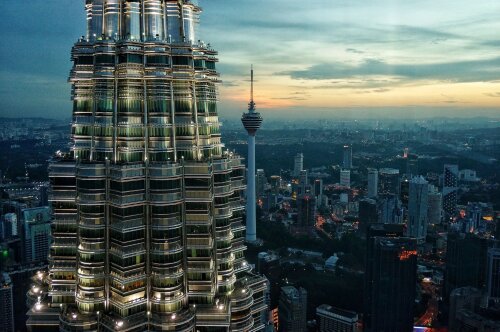Best Renewable & Alternative Energy Lawyers in Kuala Lumpur
Share your needs with us, get contacted by law firms.
Free. Takes 2 min.
List of the best lawyers in Kuala Lumpur, Malaysia
About Renewable & Alternative Energy Law in Kuala Lumpur, Malaysia
Renewable and alternative energy refers to energy sources that are sustainable and environmentally friendly, such as solar, wind, hydro, and biomass. In Kuala Lumpur, Malaysia's capital city, the government has actively promoted the growth of renewable energy as part of its national energy policy. Renewable and alternative energy law covers the regulations, permits, incentives, and restrictions that control the development, use, and distribution of green energy in Malaysia. As the country works towards increasing its renewable energy capacity, legal frameworks continue to evolve, impacting businesses, investors, and individuals alike.
Why You May Need a Lawyer
The renewable and alternative energy sector in Kuala Lumpur is governed by complex laws and regulations at the national and state levels. Legal assistance may be necessary in situations such as:
- Navigating licensing and permit requirements for new solar, hydro, or other green energy projects
- Drafting or reviewing contracts related to energy supply, power purchase agreements, engineering procurement and construction (EPC) contracts, and joint ventures
- Ensuring compliance with environmental and safety standards set by governmental agencies
- Understanding government incentives, such as feed-in tariffs or tax benefits
- Addressing disputes, including land use issues, grid access negotiations, or regulatory penalties
- Advising on intellectual property protection for innovative alternative energy technologies
- Navigating foreign investment rules if collaborating with international partners
Involvement in renewable energy projects, whether as a developer, investor, landowner, or business, often requires specialized legal advice to avoid costly mistakes and to maximize compliance and profitability.
Local Laws Overview
The legal landscape relevant to renewable and alternative energy in Kuala Lumpur is shaped by national laws, policies, and local regulations. Some of the key legislative frameworks include:
- Renewable Energy Act 2011 - Provides the legal basis for the promotion and management of renewable energy, including the Feed-in Tariff (FiT) mechanism
- Sustainable Energy Development Authority Act 2011 - Establishes the authority responsible for implementing sustainable energy policy and administering incentives
- Electricity Supply Act 1990 - Regulates the generation, transmission, and distribution of electricity in Malaysia
- Environmental Quality Act 1974 - Sets out requirements on pollution control and environmental management, relevant for any energy project development
- Land acquisition laws and town planning regulations relevant to project siting and environmental impact
Additionally, guidelines and periodic updates from agencies like the Sustainable Energy Development Authority (SEDA) Malaysia and Energy Commission (Suruhanjaya Tenaga) provide technical and compliance rules that must be observed.
Frequently Asked Questions
What types of renewable energy projects are allowed in Kuala Lumpur?
Projects involving solar photovoltaic, biogas, biomass, mini hydro, and geothermal energy are allowed, subject to licensing, permits, and environmental approval from relevant authorities.
Do I need government approval to install a solar panel system on my property?
Yes. Depending on the scale, you may need approvals from local authorities, the Energy Commission, and compliance with SEDA Malaysia's requirements if you intend to export power to the grid.
What is the Feed-in Tariff (FiT) system?
The Feed-in Tariff is a government incentive aimed at encouraging renewable energy production. Eligible producers can sell electricity to the grid at fixed, higher-than-market rates for a set period under the Renewable Energy Act.
Are there tax incentives for renewable energy investments in Kuala Lumpur?
Yes, there are various incentives such as Investment Tax Allowance (ITA), Green Technology Financing schemes, and import duty or sales tax exemptions for qualifying green technology equipment.
What permits are required for renewable energy projects?
Common permits include a Feed-in Approval Certificate from SEDA Malaysia, generation and connection licenses from the Energy Commission, and environmental impact approvals for larger projects from the Department of Environment.
How are power purchase agreements (PPAs) regulated?
PPAs must comply with Malaysian law and guidelines set by the Energy Commission. They typically govern the sale of electricity from producers to Tenaga Nasional Berhad (TNB) or other utilities and require legal review for compliance and fairness.
Can foreign investors participate in renewable energy projects?
Yes, but there are specific conditions and ownership limits depending on the type of project and its location. Legal advice is essential to navigate investment regulations.
How are environmental concerns addressed in renewable energy projects?
Environmental Impact Assessments (EIAs) are mandatory for certain project sizes and types. Compliance with the Environmental Quality Act and relevant regulations is required.
What happens if a renewable energy project fails to meet regulatory requirements?
Projects may face fines, revocation of permits, suspension of operations, or legal prosecution. Engaging a lawyer can help ensure ongoing compliance and mitigate risks.
How can I resolve disputes related to land or grid access for a renewable energy project?
Disputes can be resolved through negotiation, mediation, arbitration, or court proceedings. Experienced legal counsel can advise on the best approach based on the nature of the dispute.
Additional Resources
Several resources, agencies, and organizations can assist those seeking more information or assistance with renewable and alternative energy legal matters in Kuala Lumpur:
- Sustainable Energy Development Authority (SEDA) Malaysia
- Energy Commission (Suruhanjaya Tenaga)
- Malaysian Green Technology and Climate Change Corporation (MGTC)
- Department of Environment, Ministry of Natural Resources and Environmental Sustainability
- Ministry of Energy Transition and Water Transformation
- Tenaga Nasional Berhad (TNB) for grid connection matters
- Malaysian Investment Development Authority (MIDA) for investor incentives
- Certified energy law practitioners and associations specializing in renewable energy
Next Steps
If you believe you need legal assistance in the renewable and alternative energy sector in Kuala Lumpur, consider the following steps:
- Document your objectives, project details, or issues you are facing
- Research and reach out to lawyers or law firms specializing in renewable energy law
- Prepare all relevant documents such as permits, contracts, or correspondence for review
- Consult with the appropriate governmental bodies for information on regulations or incentives
- Schedule a consultation with a legal professional to assess your rights, responsibilities, and available options
Partnering with experienced legal counsel ensures that your interests are protected and that your renewable or alternative energy initiatives are aligned with both current laws and future regulatory developments in Kuala Lumpur, Malaysia.
Lawzana helps you find the best lawyers and law firms in Kuala Lumpur through a curated and pre-screened list of qualified legal professionals. Our platform offers rankings and detailed profiles of attorneys and law firms, allowing you to compare based on practice areas, including Renewable & Alternative Energy, experience, and client feedback.
Each profile includes a description of the firm's areas of practice, client reviews, team members and partners, year of establishment, spoken languages, office locations, contact information, social media presence, and any published articles or resources. Most firms on our platform speak English and are experienced in both local and international legal matters.
Get a quote from top-rated law firms in Kuala Lumpur, Malaysia — quickly, securely, and without unnecessary hassle.
Disclaimer:
The information provided on this page is for general informational purposes only and does not constitute legal advice. While we strive to ensure the accuracy and relevance of the content, legal information may change over time, and interpretations of the law can vary. You should always consult with a qualified legal professional for advice specific to your situation.
We disclaim all liability for actions taken or not taken based on the content of this page. If you believe any information is incorrect or outdated, please contact us, and we will review and update it where appropriate.

















